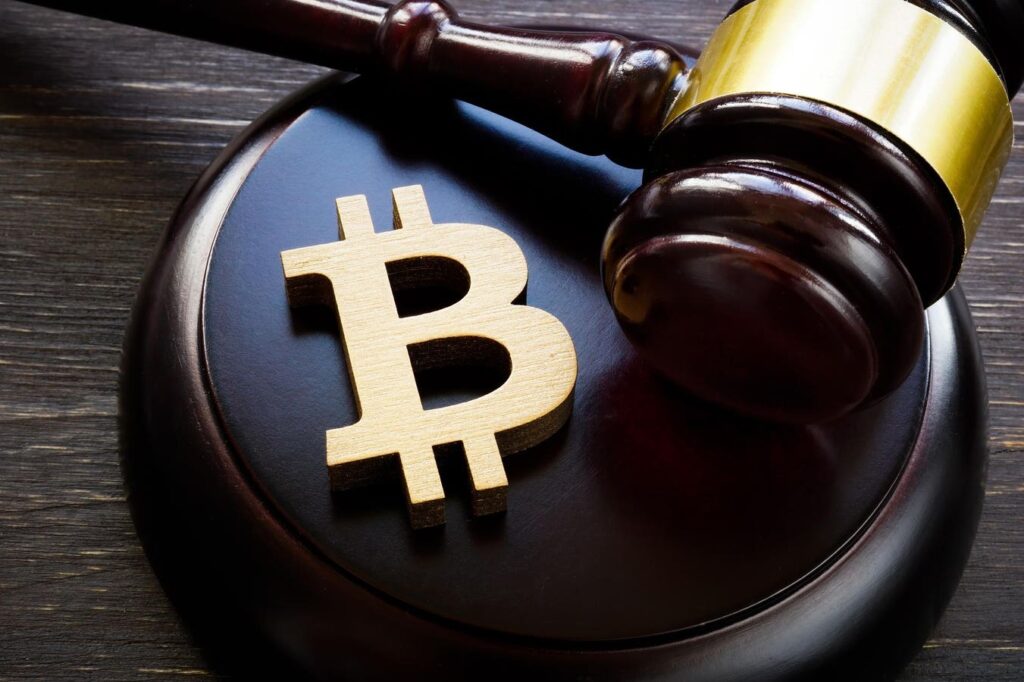Crypto.com Takes Legal Action Against SEC in Response to Gary Gensler’s Continued Regulation of Cryptocurrency

Bitcoin symbol and gavel to regulate cryptocurrencies market.
In a decisive move, cryptocurrency exchange Crypto.com has filed a lawsuit against the U.S. Securities and Exchange Commission (SEC) following the agency’s issuance of a Wells Notice, according to the legal filing. The complaint seeks declaratory and injunctive relief to prevent what the company describes as an unlawful expansion of the SEC’s jurisdiction—led by its chair, Gary Gensler, to include secondary market sales of cryptographically secured digital assets. A Wells Notice signals the SEC’s intent to pursue formal enforcement action against a regulated party.
Rather than waiting for any formal action, Crypto.com is challenging what it considers a significant overreach by the SEC. In an official statement, the company explained: “We are doing this to protect the future of the crypto industry in the U.S., joining peers who are defending themselves and taking action against a misguided federal agency acting beyond its authority under the law.”
In addition to its lawsuit, Crypto.com’s affiliate, Crypto.com | Derivatives North America (CDNA), has filed a petition with both the Commodity Futures Trading Commission (CFTC) and the SEC. The petition seeks clarification on whether certain cryptocurrency derivative products fall under the sole jurisdiction of the CFTC. Crypto.com explained that this action is part of a broader effort to bring regulatory certainty to the industry by encouraging joint rulemaking between the two agencies.
The declaratory lawsuit against the SEC is not an isolated event. Crypto.com joins other companies, such as ConsenSys, a leading Ethereum software and technology incubator company, in challenging the SEC’s authority. Recent developments have amplified concerns about the regulator’s conduct. In March, a federal judge ruled that the SEC had engaged in “gross abuse of the power entrusted to it by Congress” during its dispute with blockchain firm Digital Licensing (operating as DEBT Box). In that case, the judge criticized the SEC for acting in “bad faith” and “deliberately perpetuating falsehoods” in its efforts to secure an asset freeze against the company.
ConsenSys’s Legal Battle With The SEC
ConsenSys has also been involved in a legal challenge against the SEC. The company filed a lawsuit after being added to the SEC’s list of crypto investigation targets. However, the case was dismissed by a Texas court after the SEC closed its Ethereum probe earlier in the year. The court ruled that, with no immediate threat from the SEC, the lawsuit was unwarranted. Despite this, ConsenSys’ lawsuit underscores the ongoing tension between the SEC and the crypto industry over regulatory overreach.
ConsenSys has been pushing for a balanced regulatory framework to support blockchain growth and ensure U.S. leadership in Web3 innovation. Joe Lubin, co-founder of Ethereum and CEO of ConsenSys, emphasized the importance of regulatory clarity, warning that the SEC’s “reckless approach” threatens the future of Ethereum and U.S. competitiveness in emerging technologies. Lubin also emphasized the importance of regulatory clarity for the future of Ethereum and U.S. technological leadership: “Ethereum is a world-changing technology, and ether itself has the potential to be a significant driver of the U.S. economy of the future. Unlawful SEC regulation, however, threatens to jeopardize this potential and impedes the U.S.’s ability to use blockchain technology as the basis for countless new innovations and technologies—even as other nations race ahead.”
Both ConsenSys and Crypto.com argue that unchecked SEC overreach risks undermining U.S. leadership in the digital economy, with their legal actions calling for a more appropriate regulatory approach from the SEC and Congress.
Ripple’s Final Victory Against The SEC
A key case in the ongoing regulatory battle between the crypto industry and the SEC is Ripple’s legal fight over whether its XRP token constitutes a security. Ripple initially scored a partial victory in 2023 when a federal court ruled that XRP tokens, when sold to retail investors via exchanges, were not securities. However, the court did determine that institutional sales of XRP were unregistered securities, leading Ripple to pay a $125 million penalty—far less than the $2 billion the SEC sought.
In October 2024, the SEC appealed the decision, reigniting the legal battle. In response, Ripple’s Chief Legal Officer, Stuart Alderoty, commented via X (formerly Twitter) the appeal is “disappointing, but not surprising.” The appeal has already caused XRP’s price to drop, and it may impact efforts like Bitwise’s recent filing for the first spot XRP ETF, which now faces uncertain approval.
Ripple’s case is pivotal in the broader fight against SEC overreach, as its outcome could further shape the regulatory framework for digital assets in the U.S.
SEC’s Concerning Approach Under Gensler Leadership
Crypto.com’s lawsuit comes during Chair Gensler’s increasingly controversial tenure concerning digital assets. His enforcement-driven approach, often labeled as “regulation by enforcement,” has sparked high-profile clashes with major crypto companies, including OpenSea, Ripple Labs, and now Crypto.com. Critics assert that Gensler’s actions diverge from the SEC’s mission to protect investors and ensure fair markets. Even members of the five-member commission agree.
Crypto.com’s legal filing contends that the SEC has “unilaterally expanded its jurisdiction beyond statutory limits.” The company challenges the SEC’s classification of nearly all digital assets as securities, excluding Bitcoin
Bitcoin
(BTC) and Ether (ETH), even though these assets are “sold in an identical manner” to others the SEC seeks to regulate. Crypto.com emphasized that the SEC’s rulemaking failed to undergo the required notice-and-comment process, labeling the SEC’s approach as “arbitrary and capricious.”
Judicial Pushback Against The SEC
Crypto.com’s lawsuit follows several high-profile legal challenges to the SEC’s tactics. In the DEBT Box case, Chief District Judge Robert Shelby sanctioned the SEC for acting in “bad faith” and “deliberately perpetuating falsehoods” in an attempt to freeze the company’s assets. While the sanctions didn’t address the merits of the case, they underscored growing judicial concerns about the SEC’s handling of digital assets.
Ripple’s ongoing legal battle with the SEC also highlights this skepticism. Although Ripple initially won a partial victory in 2023 when the court ruled that XRP sales to retail investors were not securities, the SEC’s appeal in 2024 has renewed the fight. Ripple’s case, alongside Crypto.com’s lawsuit, reflects broader resistance to what many see as the SEC’s regulatory overreach.
Crypto.com, like ConsenSys and others, seeks judicial clarity to limit the SEC’s expansive interpretation of its jurisdiction over digital assets. By suing preemptively, these companies hope to establish clearer rules for the industry and rein in the SEC’s enforcement-driven approach. The rules –in the form of legislation—that has yet to come from Congress.
The Path Forward For Crypto Regulation
One of the most significant outcomes of Crypto.com’s lawsuit could be the judiciary’s growing role in shaping the regulatory landscape for digital assets. Federal courts have already weighed in on key crypto cases, such as Ripple Labs, ConsenSys, and DEBT Box, scrutinizing the SEC’s actions. The outcome of Crypto.com’s case could set a crucial legal precedent, determining whether digital assets like the “network tokens” sold on its platform are securities under U.S. law.
Crypto.com’s lawsuit marks a pivotal moment in the ongoing battle over crypto regulation. By challenging the SEC’s authority, the company is not only defending its operations but also contributing to the broader push for regulatory clarity in the crypto space. As the company stated, “We believe that security and compliance are the foundations of achieving mainstream cryptocurrency adoption, and all of what we do is done with safety, security, and compliance at the core.”
As the judiciary assumes a more central role in defining the future of digital assets, the stakes are high for both the SEC and the crypto industry. A favorable ruling for Crypto.com could restrict the SEC’s ability to regulate secondary sales of digital assets, providing a significant boost to the industry. Conversely, a ruling in favor of the SEC could further empower the agency’s enforcement-driven approach, leaving the industry with even more uncertainty.
Source link
#Crypto.com #Sues #SEC #Fight #Gary #Genslers #Ongoing #Crypto #Crackdown





